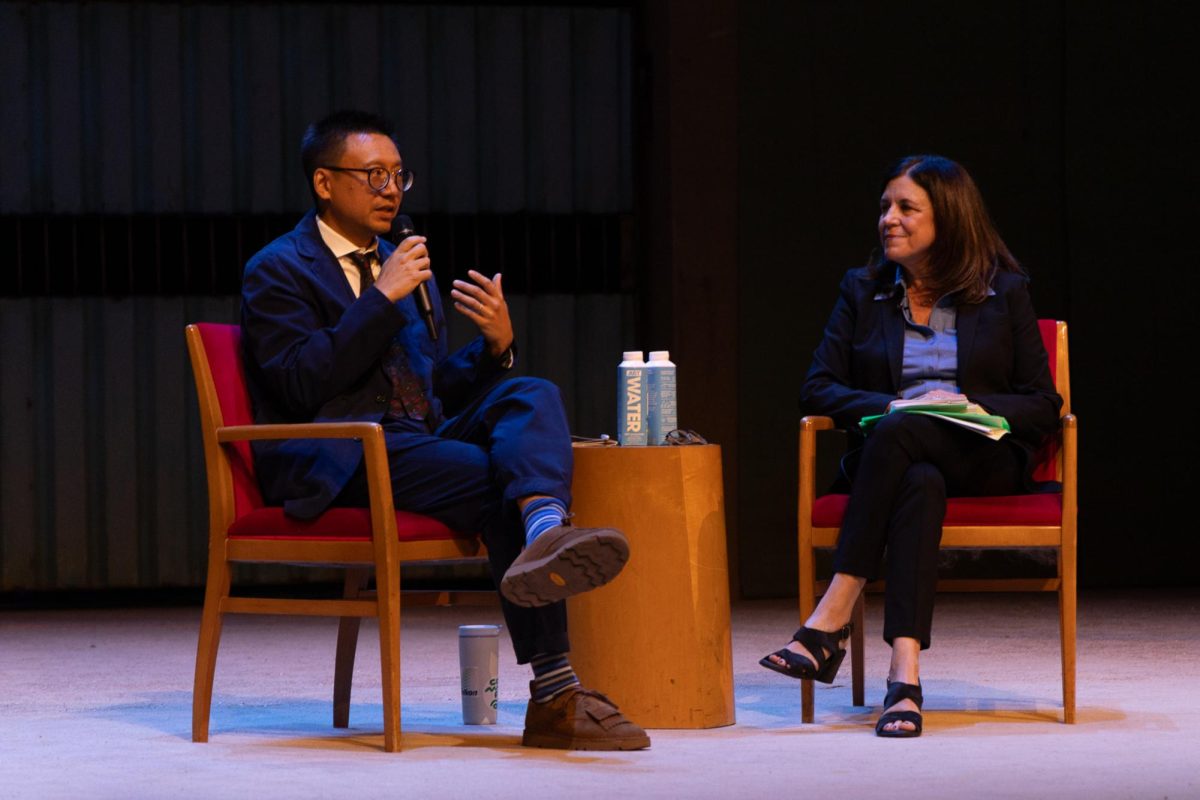Pulitzer Prize-winning author Hua Hsu, who wrote this year’s NYU Reads selection, told hundreds of students and faculty that “certain aspects” of a universitywide email from President Linda Mills that referenced his book made him “uncomfortable” and that it was not an “accurate reflection” of his words at a discussion on Monday.
In her start-of-semester letter, Mills said the university has reached an “important inflection point” following on-campus demonstrations against the war in Gaza, and encouraged students to “come together for difficult conversations.” She quoted a line from Hsu’s memoir, “Stay True,” where he wrote, “the thing you learn in college is how to live with other people.”
At the sit-down conversation, which was held at the Skirball Center for the Performing Arts, Provost Georgina Dopico asked Hsu — who is also a professor at Bard College — about the role of higher education in moments of “seeming polarization.” He said that it is “important to listen in good faith” and that “there’s a lot of paranoia and neurosis from the top down” on college campuses.
After the university faced backlash for authorizing the New York City Police Department to sweep two pro-Palestinian encampments last semester, resulting in the arrests of dozens of students, Mills wrote that “the only way forward” would be to host listening sessions for members of the NYU community. The university has since updated its student conduct guidelines in response to “calls for greater clarity.” Several on-campus groups have criticized the updated policy, which now cites “code words, like ‘Zionist,’” as examples of potentially discriminatory speech, claiming the change sets “a dangerous precedent.”
“Sometimes I mistake students acting out as an expression of power when it’s actually an expression of powerlessness or a desire to connect,” Hsu said. “It’s so banal, but listening and not determining the rules of what you can and can’t say to the point of stifling what people actually want to think about is probably a place to start.”
Since returning to campus, students and faculty have criticized restrictions to spaces previously used for demonstrations, including a wall in front of Gould Plaza, limited access to the Paulson Center’s lobby and the partial closure of the Grand Staircase at the Kimmel Center for University Life. At the discussion, Hsu said that it is “weird” that “you can’t sit down anywhere around this campus anymore.”
Hsu began writing what would become “Stay True” to help him compartmentalize his grief following the death of his friend Ken in 1998. While the book was published in 2022, it is primarily a retrospective on his “annoying and insufferable” college self.
“I really needed to put everything down onto paper in order for it to be somewhere else and for it not to be just solely in my head,” Hsu said. “For many years, I would return to it and think about it. I wrote parts of it outside NYU, in and around Washington Square Park, when I was visiting in the late ’90s and early 2000s.”
Junior Palig Avakian, who was one of the pre-selected student speakers, told WSN that one of her close friends passed away last summer and that she asked Hsu for advice on how to process loss and grief during the event.
“I found it really insightful and inspiring to hear a different perspective coming from someone who wrote about their memoir at a college age, which I currently am at,” Avakian said. “I felt very trapped and shocked, especially at the moment of loss. It was very touching to hear someone else’s perspective and thoughts that I would never have thought of before.”
Hsu also spoke about his Asian American identity, and the inclusion and exclusion immigrants experience while assimilating in the United States. He described the process as a “horizon” that many people never reach and emphasized the importance of acceptance as opposed to “chasing impossible standards.”
At the end of the event, Hsu answered questions from the audience at large. He concluded the discussion by addressing the importance of Asian American representation, describing the community as diverse with contradictions and differences.
“As there emerges more cultural production, maintaining the diversity of what that means is more important than ever,” Hsu said. “Even though there have been movies that won the Oscars or TV shows that won the Emmys — or, you know, books — making sure that that doesn’t then become a new monolithic stand-in for everything is a challenge I face, but more so, people younger than me will face.”
Hsu and the Office of the Provost did not respond to requests for comment.
Contact Krish Dev at [email protected].
























































































































































